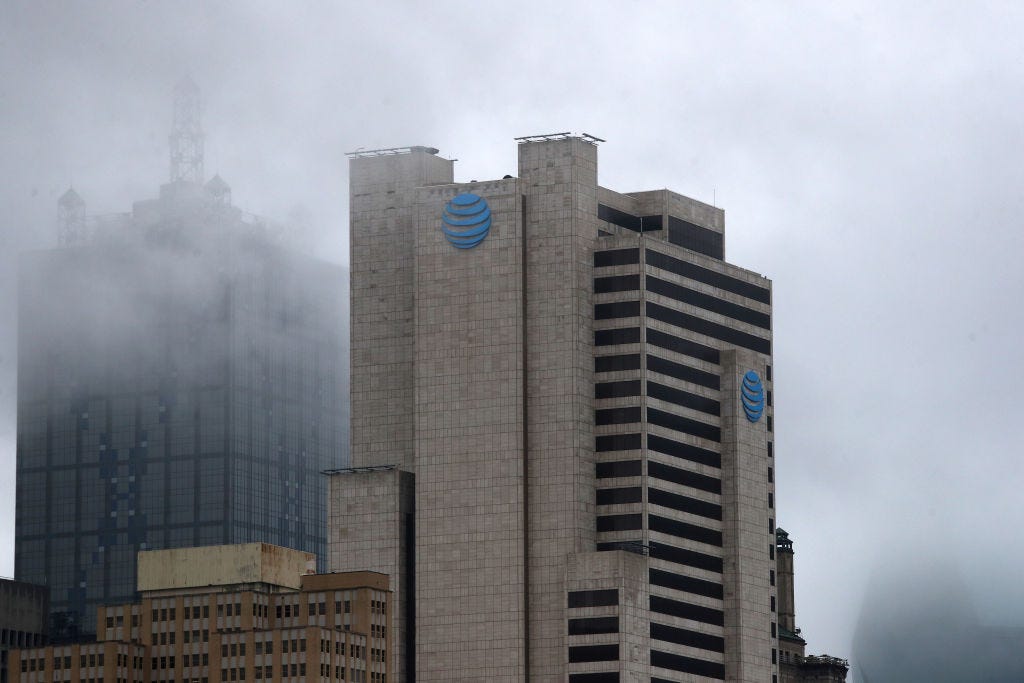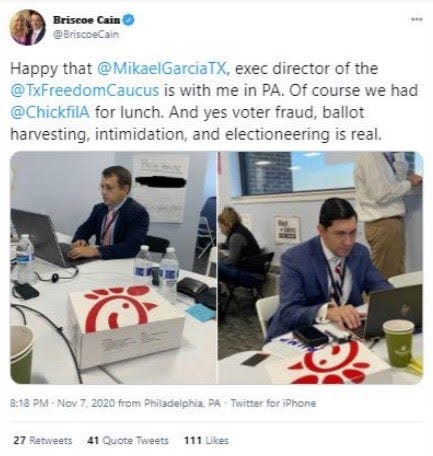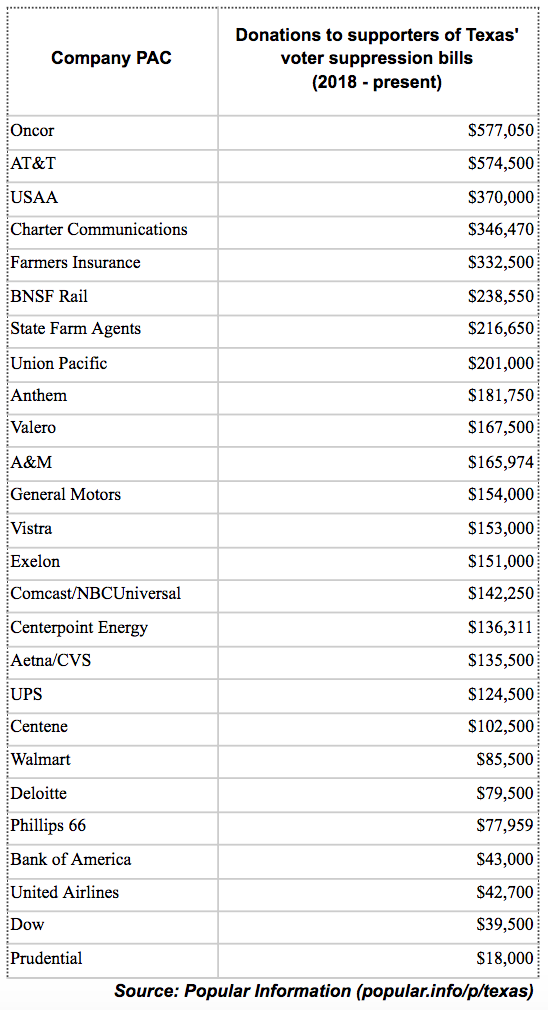
Texas already has the most restrictive voting laws in the country. But with the state trending blue, Governor Greg Abbott (R) and Republicans in the Texas legislature are pushing a series of draconian bills that would make it even harder for Texans to cast a ballot. An investigation by Popular Information reveals that the elected officials in Texas advocating for these voter suppression measures are backed by millions from corporations that purport to support voting rights.
The Brennan Center has identified a dozen bills introduced in the Texas legislature to restrict voting. But omnibus voting legislation in the Senate (SB 7) and House (HB 6) have the most traction. These are expansive, complex bills that would limit voting in a variety of ways.
Texas does not have no-excuse absentee voting and did not even allow it last year during the pandemic. SB 7 would create additional hurdles for voters in future elections seeking to vote absentee due to a disability. These voters would need to submit either: (1) Documentation of their disability from the Social Security Administration or the Department of Veterans Affairs, or (2) Certification of their disability on a form completed by a licensed physician, chiropractor, or Christian Scientist. Under SB 7, local election officials would be prohibited from mailing an absentee ballot application to anyone who doesn't explicitly request it. The bill also bans the use of drop boxes to return absentee ballots.
Notably, SB 7 would also require all countywide polling places to have approximately the same number of machines. Why is this important? It would effectively prohibit the use of sports arenas as mega-voting locations. Last year the arenas for the San Antonio Spurs, Dallas Mavericks, and Houston Rockets were all used for voting.
SB 7 would prohibit mobile, outdoor, and drive-through polling locations. Last year Republicans unsuccessfully sued to invalidate 127,000 votes cast in drive-thru polling locations. The bill would guarantee that poll watchers have "free movement" inside of polling locations and end the prohibition on poll watchers filming voters, including inside of a voting station. Anyone who "obstructs" a poll watcher could be charged with a crime. Combined, these measures are a recipe for voter intimidation.
HB 6 has a number of provisions in common with SB 7. For example, HB 6 also prohibits election officials from mailing unsolicited absentee ballot applications. HB 6, however, would make the violation of the provision a felony.
HB 6 also contains additional restrictions not contained in the Senate's omnibus bill. It creates a new crime of being compensated for "vote harvesting" services. It defines vote harvesting very broadly, however, to include “direct interaction” with voters “in connection with” ballots or mail ballot applications that is “performed with the intention that ballot be cast for a specific candidate.” Under HB 6, a volunteer phone banker who answers questions about how to return an absentee ballot and is provided with snacks by a campaign could potentially be charged with a crime.
Voting rights advocates slammed the bills as a shameful attempt to suppress votes, targeted at communities of color and other historically marginalized Texans. "Senate Bill 7 and House Bill 6 are bad for Texas voters from all walks of life –– they especially make voting more difficult for voters of color and voters with disabilities. Using self-serving falsehoods, the politicians in power in Texas are shamefully trying to disenfranchise Texans instead of making sure our elections are free, fair, and accessible," Myrna Perez, Director of the Voting Rights and Elections Program for the Brennan Center, told Popular Information.
Texas Governor Greg Abbott (R) and Lieutenant Governor Dan Patrick (R) have thrown their support behind the proposed legislation to restrict voting. In a press conference with some of the bill sponsors, Abbott admitted that "he was not aware of any fraud that occurred in Texas during the 2020 election." Texas Attorney General Ken Paxton (R) and his staff spent 22,000 hours searching for evidence of voter fraud in Texas last year and found 16 people who put an incorrect address on their voter registration forms.
Yet Abbott, Patrick, and the sponsors of the voter suppression legislation in Texas are backed by millions of dollars from corporations that publicly embrace voting rights. AT&T, for example, posted a four-minute video to its corporate website documenting a trip that employees took to Selma, Alabama to honor John Lewis and others that fought for the right to vote.
In a corporate blog post last summer, AT&T acknowledged the role that corporations play in achieving justice, again citing the work of John Lewis as an example:
Change starts with us. Businesses have a big role in making it happen. AT&T acknowledges its distinct responsibility to be part of the solution to achieve equitable justice…
[I]t’s important...to note the loss of two local heroes who championed human dignity on the global stage – Congressman John Lewis and Reverend C. T. Vivian. Their lives remind us that positive change is possible and continue to inspire us to work together to end societal injustices.
Yet, in the last three years, AT&T has donated $574,500 to Abbott, Patrick, and the sponsors of Texas' voter suppression bills. AT&T has donated $150,000 to Patrick, who enthusiastically supported Trump's false claims of voter fraud. Patrick announced he would pay up to $1 million to anyone who comes forward with evidence of voter fraud. "I support President Trump’s efforts to identify voter fraud in the presidential election and his commitment to making sure that every legal vote is counted and every illegal vote is disqualified," Patrick said. He even referenced concerns about "voting machines," a nod to baseless allegations that voting machines were rigged for Biden in key states. Patrick also endorsed a Supreme Court lawsuit filed by Paxton to throw out millions of votes in four states.
AT&T has also donated $12,500 to Texas Senator Angela Paxton, a co-sponsor of SB 7, who was in D.C. on January 6 and appeared on stage at the "Stop the Steal" rally that preceded the riot. The company donated $3,000 to Texas Representative Briscoe Cain (R), the lead sponsor for SB 6. After November's election, Cain traveled to Pennsylvania "to be part of President Donald Trump's legal team working on the president's challenge to the election results in the state." In a now-deleted tweet from Pennsylvania on November 7, Cain said that "voter fraud" is "real."
AT&T is not alone. Popular Information's investigation found that, since 2018, corporations have donated millions to Abbot, Patrick, and the sponsors of legislation to restrict voting in Texas. A significant portion of the money comes from prominent national corporations that publicly profess their support for voting rights.
The one company that opposes voter suppression efforts in Texas
Popular Information contacted 26 companies and asked if they support SB7 and HB6. Only one company, Prudential Financial, publicly opposed the legislation in question. The company told Popular Information that it “believes in ensuring Americans have equal access to the right to vote, and we do not support this legislation.” Since 2018, Prudential Financial has donated $18,000 to the 11 Texas legislators currently sponsoring legislation to restrict voting. The company also confirmed that all political donations remain paused.
On March 10, Prudential said it opposed the 22 bills introduced in the Arizona legislature to restrict voting.
25 companies that are staying quiet
Of the 26 companies contacted by Popular Information, 25 did not take a position on the bills to restrict voting in Texas. Many of these companies also claim to be champions of voting rights.
Charter Communications has donated at least $346,000 to Abbott, Patrick, and 48 Texas legislators sponsoring voter suppression bills. Last year, leading up to the election, the company boasted that it was launching an Election Hub across a series of networks that provided “information on local candidates and ballot questions, voting locations, and instructions on how to vote by mail.” In November 2020, Charter Communications donated $1,000 to Representative Kyle Biedermann (R), who traveled to D.C. to on January 6. A video posted to Parler captured Biedermann "near the steps of the U.S. Capitol on Jan. 6 as a violent mob clashed with police and moments after rioters breached the building's outer barricades." Asked about his involvement in the riot, Biedermann said he "along with thousands of Americans, peacefully marched on our nation’s Capitol to make our voices heard." Charter Communications did not respond to a request for comment.
Farmers Insurance has donated at least $332,500 to the legislators pushing to restrict voting access in Texas, including $20,000 to Senator Paxton, who attended the "Stop the Steal" rally on January 6. Farmers Insurance is a member of “Time to Vote” –– a coalition of companies that help ensure employees have paid time to vote. In August 2020, a spokesperson from Farmers Insurance told HR Dive that it “places a high value on our people's ability to exercise their civic duties and participate in the democratic process." Yet, the company, which operates over dozens of offices in Texas, did not comment on SB 7 and HB 6. It told Popular Information that it “has a proud history of bipartisan participation in the democratic process” and that it will “continue to evaluate our funding activities moving forward.”
Deloitte says it believes that “it’s important that as many eligible voters as possible participate in our elections.” Recognizing that “the United States has one of the lowe[st] voter turnout rates in the developed world,” the company partnered with Time to Vote and the Civic Alliance to increase voter participation. Yet, since 2018, the company has donated at least $79,500 to Abbott, Patrick, and legislators sponsoring voter suppression bills since 2018. Deloitte donated $4,000 to Texas Senator Brandon Creighton (R). In November, Creighton wrote to Attorney General Bill Barr and demanded an investigation into "the voting irregularities in the vote-counting process for the 2020 presidential election." Deloitte did not respond to a request for comment.
Union Pacific also did not comment on SB 7 and HB 6. The company previously told Popular Information that it did not support the 22 bills introduced in the Arizona legislature to restrict voting. It has donated since 2018 at least $201,000 to Abbott, Patrick, and 20 of the sponsors of voter suppression bills in Texas, including $9,500 to Texas Senator Bryan Hughes, the lead sponsor of SB 7. The company told Popular Information that it has “a history of giving to political candidates and partisan organizations on both sides of the aisle” and that its pause on political donations remains in effect.
Over the past month, Popular Information’s investigations have revealed similar trends in Georgia, Arizona, and Florida. In these states, the legislators attempting to restrict voting are backed by prominent corporations who have mostly remained silent.
Below is a full list of the companies contacted by Popular Information, along with the amounts donated to Abbott, Patrick, and the sponsors of the bills since 2018:





I'm continually thankful we have you keeping tabs on these corporations, Judd, but damn if it isn't daunting seeing a wall of donations from some of the biggest names in the corporate landscape.
Good. Keeping these donations in the public eye is important. Thank you, Judd. Congress needs pressure to can these and reform campaign finance laws. Write your Representatives and Senators. Let them know to paraphrase Capitol One, "We know what's in your wallet."